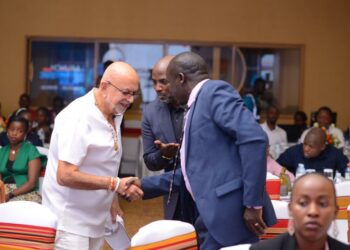By Dr. Ian Clarke
The uproar over the tax on social media has its roots in two issues. The first is that it is seen as a curtailment of freedom of speech and freedom of information, but the second is an outcry against putting tax on a free thing.
Everybody loves something that is free, but in Uganda we have taken it to a whole new level, and encourage people to believe that getting something free is normal. This way of thinking has been reinforced by advertising, in which people are told they just have to place a bet to get rich, or open a bottle of soda to win millions.
There is an advert run by one of the soft drinks companies, in which a student who won 10,000,000 shillings, is interviewed, and reassures the public it is real. People just need to buy another soda, and they will get rich. The truth is that the odds of winning are miniscule, but there would be no point in telling people the truth; that would not sell drinks. The same psychology is used by all sports betting shops who show the prize-winners, but hide the odds, leaving people to live in hope that the next bet will ‘win big’.
This belief that you can get something for nothing is strong in our culture and is reinforced by government and political parties that promise benefits, including free healthcare and free education, among others. While free healthcare and free education sounds good, the reality is there is a cost and someone has to pay. In our case these benefits are paid by Ugandan taxpayers and donors. So while the donors are giving us something for nothing, the rest of the cost of borne by those Ugandans who actually pay tax.
However, since most Ugandans don’t pay tax, these services are free. Moreover they are taken as an entitlement – that it is the responsibility of government to look after them. One result of this attitude is that many men beget many children and take no personal responsibility for them. Aid agencies are also blamed for contributing to this attitude of dependency, because people are given hand-outs and do not learn to fend for themselves.
Middle-class Ugandans have fewer children than the poor, which would seem to be contradictory since they have more resources to raise children. This is because they want their children to have a good education, and they shoulder the cost of private education for their children. However, if you visit Namuwongo slums you will find large numbers of children, yet the fathers are not concerned about having to pay for their education because it is ‘free’. Some men who have fathered scores of children have even appeared in the newspapers appealing to government for assistance. This begs the question as to why such men fathered all these children if they could not take responsibility for them.
Many people have made the argument that it is the responsibility of us all to pay our taxes, because how else will government pay for programmes such as making new roads. The truth is that only a small section of the population in Uganda are taxed – those in the formal sector – which is why we have a low tax base. When the URA is put under pressure by government to raise more taxes they go back again to the same formal sector and squeeze out some more money. This is unfortunate for those who are in the formal sector, but the rest of the population are not really bothered because they are benefiting from the ‘free’ government services.
Another section of the population, the Members of Parliament, who vote in these heavy taxes, don’t pay tax at all, so they don’t share the pain. However, on this occasion they taxed the section of the population, which votes for them and normally goes free, which caused widespread uproar. Now the Parliamentarians are scrambling to reverse the tax because it has made them unpopular with their voters. There are good political reasons for taxing only one section of the population, because these are not the majority of voters: the votes come from the masses, which go free.
But economically, the present system is unsustainable because it is not creating wealth and thereby expanding the tax base. Winston Churchill said that taxing heavily is akin to standing in a bucket and trying to lift oneself up, using the handle, which is what is happening to business in Uganda. Spreading the tax burden across the whole population, with everyone paying a little, would be preferable to what we have at present, where the majority go free while the minority pay.
We need small amounts of taxation on large numbers of people, but such a policy will be resisted by those who have grown to believe that they are entitled to get everything free.
Do you have a story in your community or an opinion to share with us: Email us at editorial@watchdoguganda.com












